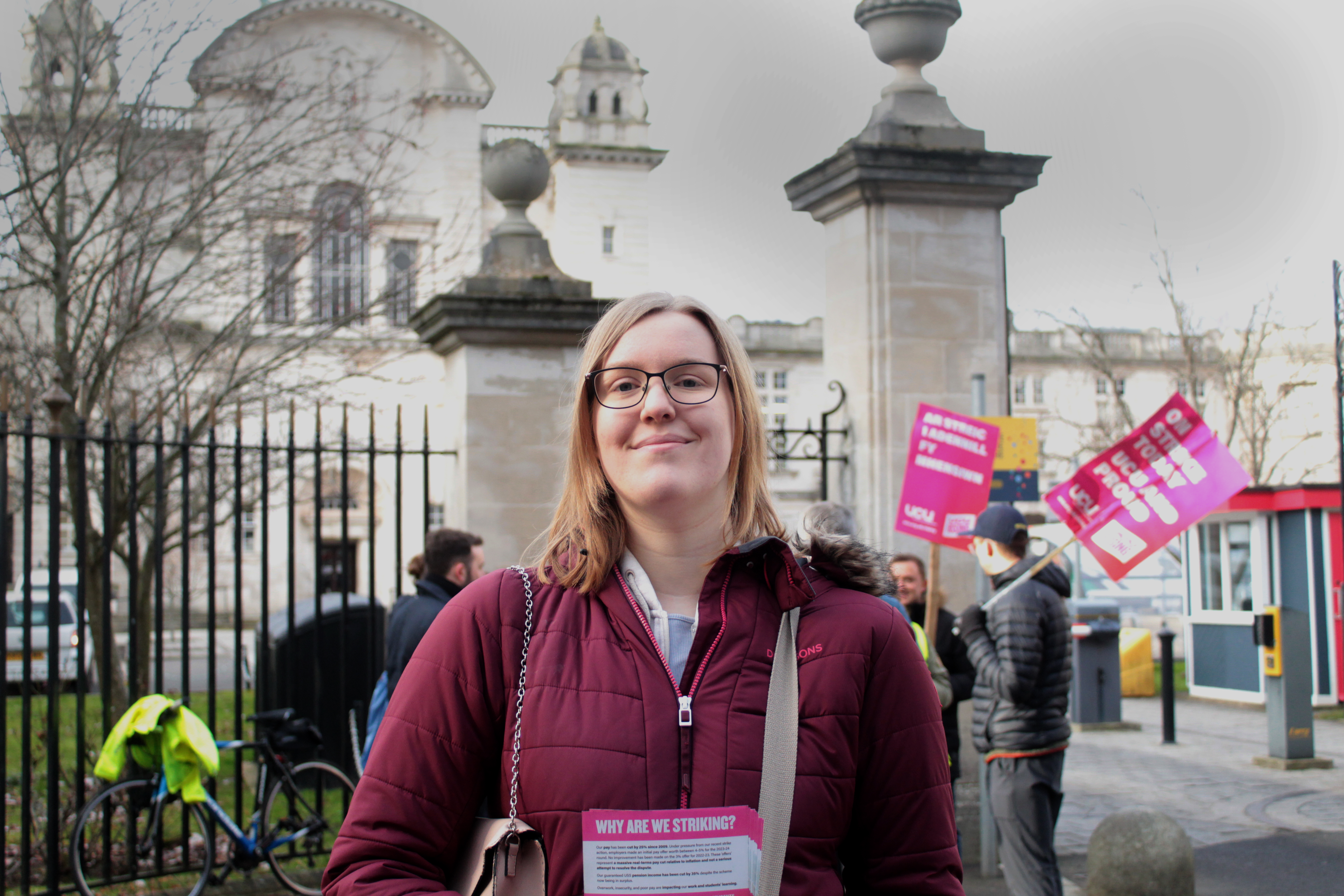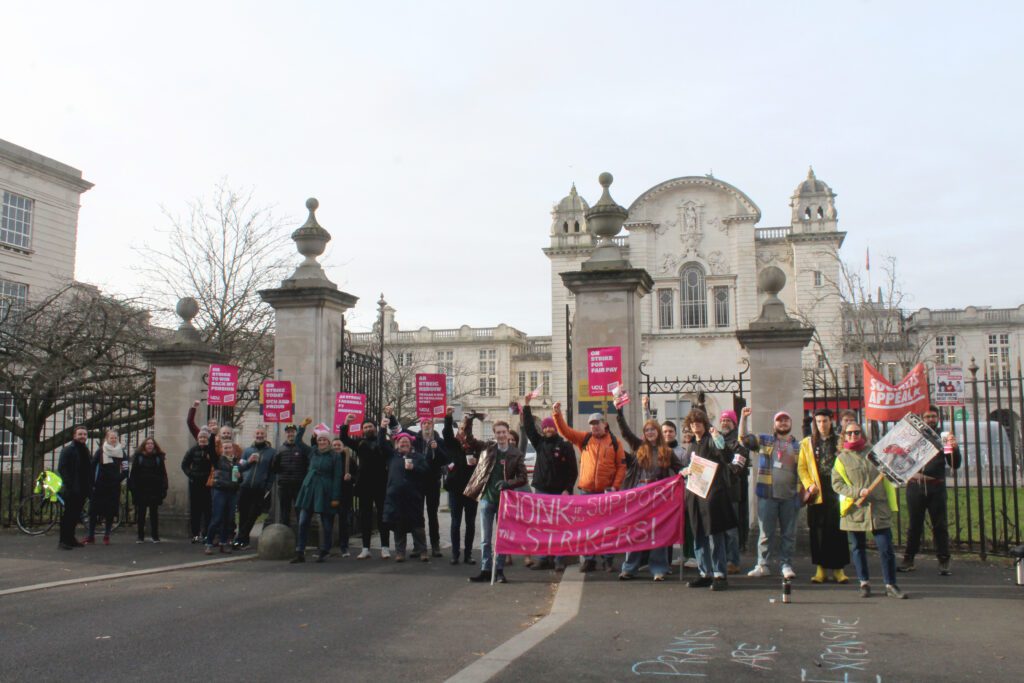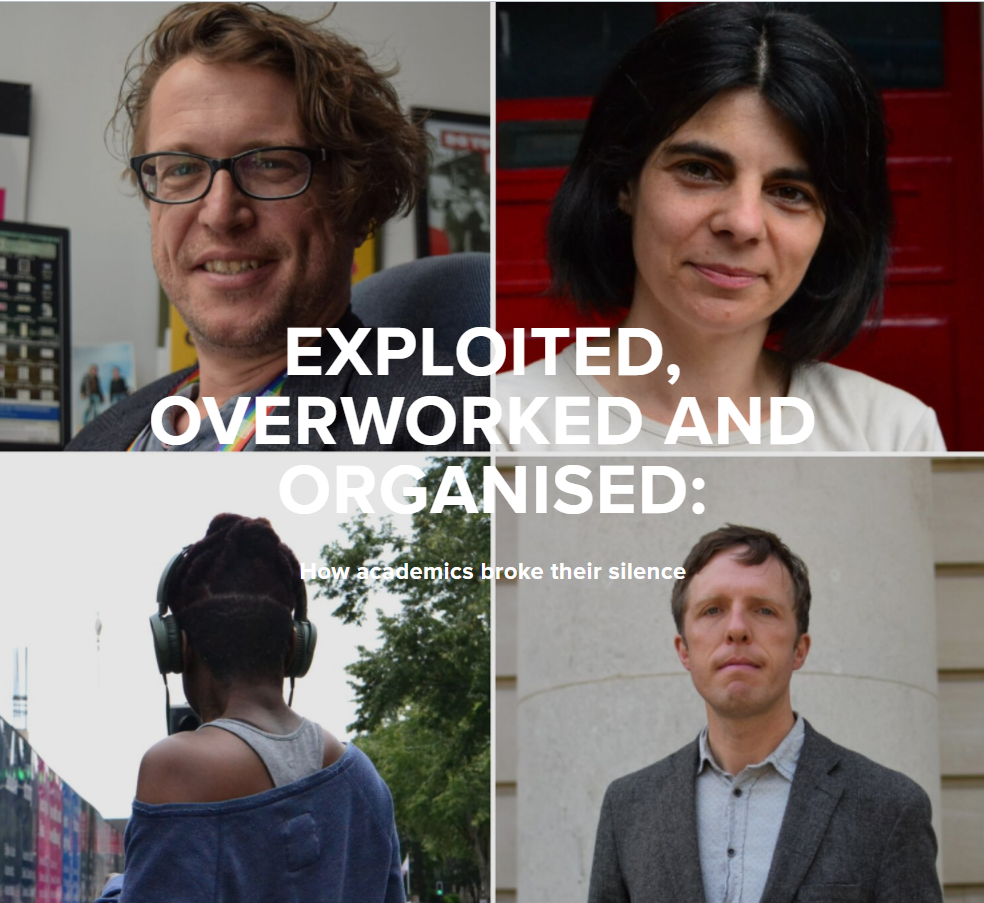
“I Could Relate To That Struggle” – Student Poverty Drives Solidarity With University Strikes
As university workers escalate their strike action for fair pay, pensions and working conditions, students are having to decide which side they are on. As Oojal Kour finds out, their own experience of the cost of living crisis is leading to increased support for the walkouts.
By Oojal Kour. Cover image by Oojal Kour
Donning bright pink hats on a pleasant winter morning outside a Cardiff University picket line, over a hundred university workers and students stood with placards and banners campaigning for fair pay, improved funding, restoration of pension benefits and job security.
These picketers had already taken part in three days of industrial action, kick-started by several hundred people marching from the university to the UK Parliament building on February 1st, joining almost half a million workers from different unions who struck that day.
Every strike has its own dynamic, but a driving force in them all is the reality of huge price rises coupled with wages that don’t even come close to keeping up. But the so-called cost-of-living crisis is also having a profound effect on students, especially those from working class backgrounds.
This has plunged many of them into the frontline of the crisis, and is increasing solidarity towards the strike by the University and College Union (UCU).
Among these students is Bonnie Weaver, a fourth-year student at Cardiff University who has supported her lecturers since she was a fresher.
“With the cost of living crisis, it’s become important now more than ever to make sure that workers are being paid and treated properly by those higher-up, so they can afford to live,” she said. “I support them wholeheartedly.”
Bonnie says that student support for the strikes is strengthening as they witness firsthand how the cost of living crisis is damaging workers. “Lecturers are having less and less time to do what they want to do and actually live a life,” said Bonnie. “I joined (the strikes) in the first place because I could relate to that struggle a little bit.”
She describes herself as coming from a ‘low-income background’, and having to rely on student loans to survive. “It’s getting a lot harder to stick to a budget. I’ve had to start eating less every day. Rent is also getting really expensive. I’m struggling to live right now as it is. We are getting by, but barely.”
With her friends, Bonnie recently started letting a small flat in Cardiff, but they each have to pay upwards of £450 a month on rent alone.

Speaking near a picket line outside the main university library, Zacchaeus Hayward agreed that the current situation has hugely impacted how students view the strikes.
“The idea of the wolf being at the door is now something we recognise. It’s not an abstract concept that lecturers are struggling,” he said.
“We feel the chill in our bones and the pang at the bottom of our stomachs. Of course it makes sense to us that other people are struggling too, because it’s a terrible time not to have any money. Everything has gone up, and the payment certainly hasn’t. It’s awful.”
In relation to this is the fact that many students work themselves, often in low-paid industries, or will have family members who have been on strike in other sectors – also in response to falling pay and rising prices.
Zaccheaus highlights how his father is fighting for better conditions and pay as a health worker. “My dad’s been out on strike recently because he is a nurse. He left lecturing to be a nurse. No matter what you do, you end up on the picket line.”
The issue of student solidarity is only set to become more important as the strikes go on.
Last month, the UCU confirmed it would take 18 days of strike action in February and March. This is part of a larger dispute between UCU and the employer body, Universities and Colleges Employers Association (UCEA), who offered a 5% increase across-the-board.
When put to the vote, this was rejected by union members as it equated to a significant real-term pay cut and was branded as an insult. It also failed to address two central issues of severe workload, and insecure employment practises — over 90,000 university staff are employed on casual contracts, which offer no job safety and damages their mental and physical health.
Unless a better offer is made alongside commitments of removing historical discrepancies and anti-casualisation, there will be no looking back from UCU, with all strike action to resume.
Cardiff Students Union’s sabbatical officers backed the UCU strike action in November 2022, and last week, standing on a picket line, NUS Wales president Orla Tarn declared that students stood in solidarity with striking university workers, saying that “everyone deserves fair pay & work conditions.”
UCU Wales President John James believes that this kind of student support is crucial and part of a wider fight for education. He told voice.wales, “Your learning space is our workplace. If our workplace is not fit for practice, then neither is yours. It’s not right.”
“If your lecturer is more fussed about how they’re going to be paying their electric bills, gas bills, putting petrol in the car, whether they can actually afford to actually buy some cold drinks in the morning, they are going to be concentrating on that, when they’re supposed to be preparing your lessons. If I was a student, I would be absolutely tamping.”
George Phillips, a Cardiff University student, agrees that all students must direct their anger towards university management.
“Our learning conditions are directly correlated with staff working conditions,” he said. “If staff don’t have the resources, the time to prepare lectures, mark work, then the content they deliver is not going to be to the level that we expect it.”
“For decades, all university and education staff have been subjected to a reduction in pay, working conditions, increased workload. The senior leadership has not done anything to address staff concerns,” he said.
In addition to this, the strikes are also leading students to criticise the financial model of education.
Zacchaeus questions where the millions of pounds the university receives through student fees are used. “If all students are paying £9000+ a year, lecturers’ pay hasn’t gone up in a good few years, pensions haven’t increased, and they are working fewer hours and are still on temporary contracts, where’s the money gone?”
“I think it might be into massive vanity projects, like the great white elephant at the end of the road – the Centre for Student Life,” he says, in reference to the £50 million building built along Park Place, with state-of-the-art facilities. “…Investing in staff to put inside those buildings is far more valuable than any fancy, shiny new property,” he adds.
For Bonnie, another crucial factor has been learning about the workload pressures faced by her lecturers, something she can relate to.
She used to think that her difficulty with coursework was down to her own fault, but then realised that lecturers were in the same boat.
“I’ve struggled to get all my deadlines done. I’m working nine till nine every day, even on weekends just to get everything done on time,” she said.
“But then when I hear the stories about how the lecturers have got all these deadlines to meet as well, how they can’t just work contracts of nine till five. And they’re having less and less time to do what they want to do and actually live a life. That was one of the reasons I joined [the strikes] in the first place.”
Bonnie hopes that the public will come to a consensus that all workers deserve better. “Everyone’s attitude has started to change, everyone’s starting to realise that we all need to fight for better working conditions.”


